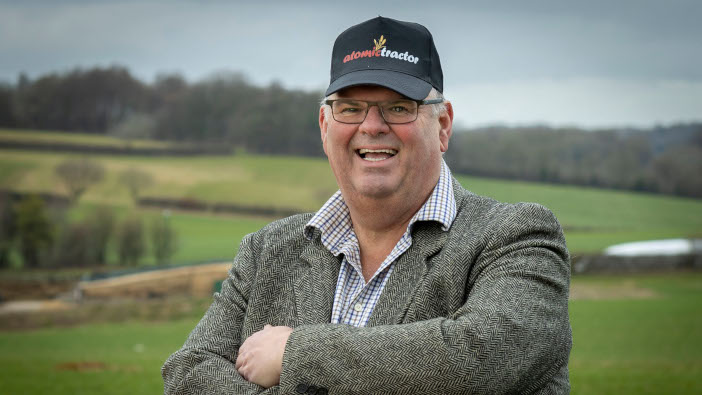Atomictractor, a new UK startup has unveiled plans for a new zero-emissions power source for conventional tractors.
Founded by Campbell Scott, a former senior executive with global agricultural equipment firm AGCO and its brand Massey Ferguson, the company has completed a feasibility study with Aston University in Birmingham looking at low carbon technologies.
The solution, which has been developed to the advanced concept level, is said to provide a highly-efficient answer for farmers seeking to eliminate diesel costs and future-proof their energy source. The hybrid concept will deliver high torque and power, as well as reportedly ensuring long working hours with minimum downtime for recharging.
“The precise nature of the technology remains confidential,” explained Mr Scott. “However, it can be described as the application of the most appropriate solutions from the low-carbon world today and their integration into the specialised field of agriculture.”
The power unit is being designed and developed in the UK but will be suitable for global use across a wide range of power applications. The initial focus is on tractors up to 134hp.
Partners are now being sought to move the project into the prototype and commercialisation phase, with developments continuing in collaboration with Aston University.
“We would ideally like to partner with an existing tractor manufacturer,” added Mr Campbell. “There is a degree of engineering interface required between the new low-carbon drivetrain and the donor tractor and this can be best provided by the tractor maker. However, I am keen to discuss the project with all interested parties who share my vision to deliver practical approaches to the complex problems facing the future of mobile off-road energy sources.”
Speaking for Aston University, senior lecturer Dr Abed Alaswad said: “Having studied the feasibility of the proposed concept under the ERDF (European Regional Development Fund) programme ‘Promoting Functional Materials’, we are keen to support this promising initiative. Our lab facilities and research expertise are very well equipped to advance research in this area.”
Linda Savitri, business navigator at the Coventry and Warwickshire Local Enterprise Partnership (CWLEP) Growth Hub, said: “We have given Atomictractor ongoing advice and referred them to various support programmes including the SMARTERIALS programme at Aston University which involved carrying out a feasibility study for this exciting project.
“We have also provided this innovative start-up with access to mentoring support since the Growth Hub is here to help businesses of all sizes to secure advice and information with their growth plans.”
Atomictractor is based in Coventry and aims to build on the longstanding tradition of tractor developments in the city, where more than three million tractors were designed, manufactured and exported.
Another key element in the initiative will be a new electric-powered small tractor. “With this, we are taking our cue from the design principles of the famous Ferguson TE20 ‘Little Grey Fergie’ tractor, first produced in Coventry in 1946,” said Mr Campbell. “Like the TE20, this new futuristic model – called the E20 – is aimed at smaller farmers all over the world who need a simple, workmate machine to carry out multiple jobs on the farm.”
Campbell Scott is well-known in the farm machinery sector and has vast experience in the development and marketing of tractors and agricultural equipment extending over 30 years. Since leaving AGCO, he has focused on the technology, public policy and commercial factors involved in the marketing of Electric Vehicles and extensively studied how they can be applied to the world of agriculture. This has included a Certificate in Electric Vehicles from Delft University and attendance at more than 10 major conferences and exhibitions on the subject.
“Agricultural applications make their own unique demands on a power source,” he remarked. “The integration of low-carbon solutions is a specialised subject which requires new and innovative thinking outside the traditional sphere of tractor engineering.”


